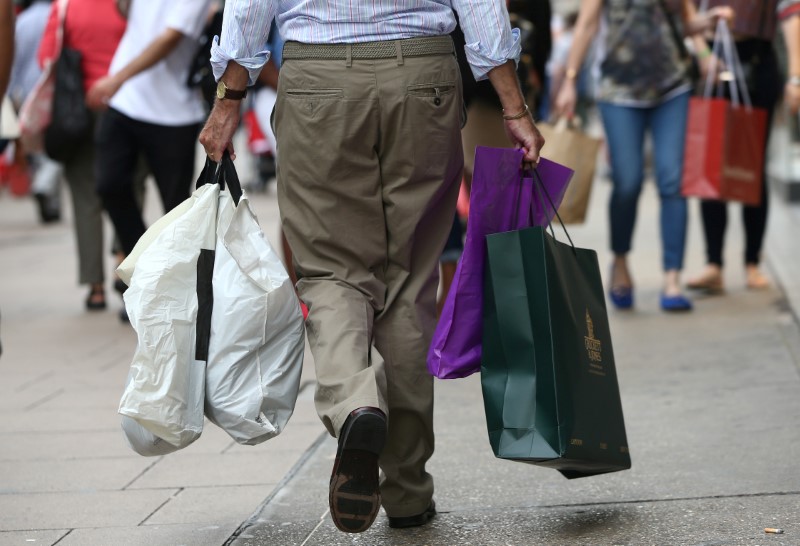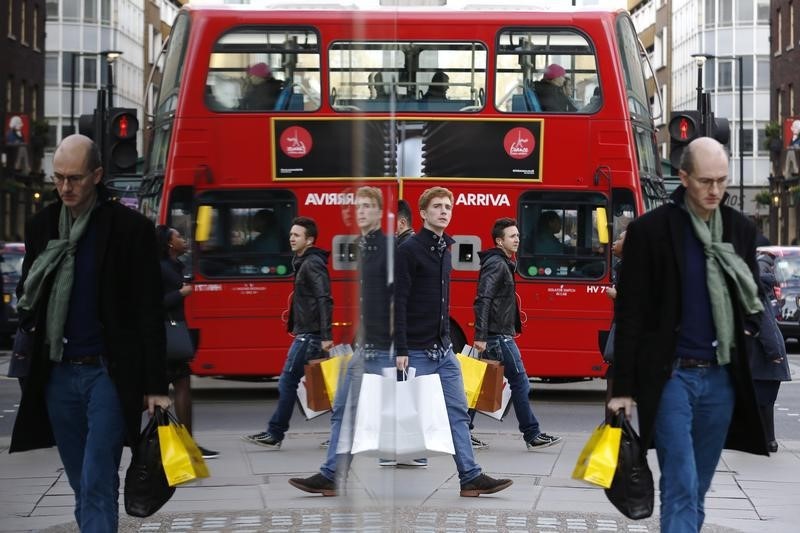By David Milliken and Alistair Smout
LONDON (Reuters) - British retail sales slowed unexpectedly sharply in September, dragging quarterly growth to its weakest annual rate since 2013 and suggesting consumer demand remains uncertain as the Bank of England nears its first rate rise in a decade.
Retail sales volumes fell 0.8 percent in September, the Office for National Statistics said on Thursday, reversing a jump in August and undershooting all economists' forecasts in a Reuters poll. Third-quarter growth slowed to its lowest year-on-year rate since the second quarter of 2013 at 1.5 percent.
Last month the BoE said it was likely to raise interest rates in the coming months if the economy and inflation pressures strengthen as expected, but in recent days a few investors have begun to doubt if the BoE will move as soon as next month.
Markets see a roughly 80 percent chance of a rate rise on Nov. 2 after the BoE's next meeting, but sterling fell to a one-week low of $1.3126 after the data on Thursday as rate futures pared back the odds of further rate increases in 2018.
"Uncomfortable questions have been raised about just where UK growth is going to emerge from in Q4," said Jeremy Cook, chief economist at foreign exchange services company WorldFirst.
"We will find out in the coming months whether this is consumers holding off on purchases in preparation for Christmas, or whether the Bank of England's messaging on interest rate rises has been enough to keep some hands in pockets."
BoE policymakers said in September that consumer demand was showing signs of improving after weakness earlier in the year, though it was too soon to tell if it would compensate for weak business investment.
The ONS said Thursday's figures pointed to retail sales adding 0.03 percentage points to economic growth in the third quarter, compared with 0.09 percentage points in Q2. The BoE and most economists expect economic growth of around 0.3 percent.
LESS FOR THEIR MONEY
The rising cost of goods in stores - which are now increasing at their fastest since March 2012 - meant the amount British shoppers were getting for their money was growing more slowly than the amount they spent, the ONS said.
"The slump in retail sales in September was driven by retailers implementing large price rises," Samuel Tombs of Pantheon Macroeconomics said.
However, he and other economists cautioned against drawing too strong conclusions about the overall health of consumer demand from trends in retail sales.
Compared with a year earlier, sales volumes in September alone were up 1.2 percent versus the average forecast in a Reuters poll of a 2.1 percent rise.
Consumer price inflation hit a five-year high of 3.0 percent in September, largely reflecting the fall in the pound pushing up the cost of imports since last year's Brexit vote.
Pay has not kept up. Official data on Wednesday showed that regular pay in the three months to August was 0.4 percent lower in real terms than in 2016 - the sixth consecutive month of falls and the longest such run in almost three years.
Some shoppers are tightening their belts, as industry data on Tuesday showed the market share of Britain's four biggest supermarkets falling in response to growing sales at German discount chains Aldi and Lidl.

Relatively cheap online fashion retailer ASOS (L:ASOS) also revised up growth forecasts on Tuesday, in part due to stronger demand after it froze its prices despite higher import costs following last year's fall in the pound.
